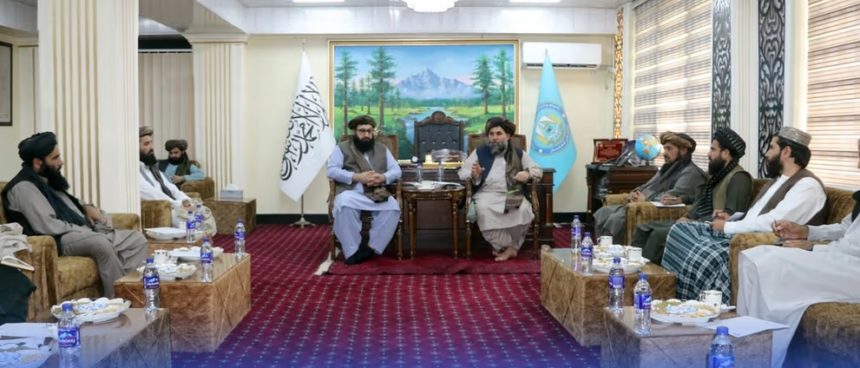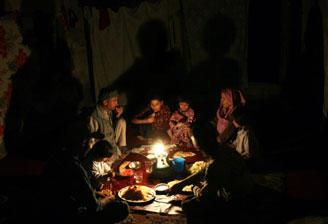RASC News Agency: In a deeply troubling development that signals the Taliban’s escalating campaign to dominate and distort international engagement in Afghanistan, Aminullah Obaid, the Taliban-appointed governor of Kabul, met with a representative of the United Nations Assistance Mission in Afghanistan (UNAMA) on Tuesday, demanding that the UN mission operate in full compliance with the group’s political and ideological directives. In a statement released by the governor’s office, the Taliban claimed that the UNAMA representative had agreed to this demand a claim that, if true, represents a dangerous erosion of UN neutrality and principles. According to the Taliban’s official press release, the meeting was held at the provincial headquarters and included Taliban officials overseeing public health, economic affairs, rural development, and other key sectors. The stated purpose of the session was to “enhance coordination and cooperation” between UNAMA and Taliban-controlled departments an increasingly common euphemism used by the group to mask its coercive control over humanitarian and development activities.
Governor Obaid reportedly stated that UNAMA’s presence and efficacy in Afghanistan hinge upon “complete coordination” with the Taliban’s administrative apparatus. He further insisted that the distribution of aid and evaluation of development projects must be aligned with what he described as the “real needs” of the Afghanistani people a phrase that has become code for enforcing Taliban ideology, particularly with regard to the exclusion of women and minorities from access to resources and public services. The Taliban also claimed that the UNAMA representative for the Central Zone offered assurances that future operations would be adjusted to conform to the group’s expectations. This assertion has not been independently confirmed by the UN, and the organization’s continued silence on such statements has only intensified concerns about a possible capitulation to Taliban pressure.
This meeting is the latest in a series of calculated steps by the Taliban to reshape international cooperation on its own terms. In early April, the group’s de facto foreign minister met with the United Nations Secretary-General’s Special Envoy for Afghanistan, bluntly declaring that any future collaboration with the UN would be conditional upon adherence to the Taliban’s worldview. The regime, he suggested, would be willing to engage with all UN-led initiatives so long as they did not challenge its authority or ideological dominance. Meanwhile, reliable sources within diplomatic circles in Kabul have disclosed that senior UN officials have been holding discreet consultations with Taliban envoys regarding a controversial political roadmap for Afghanistan. These closed-door talks have reportedly touched upon deeply contentious issues, including the potential formation of an “inclusive government,” the reversal of the Taliban’s ban on female education, the dismantling of terrorist networks operating inside the country, and most controversially the Taliban’s demands for formal recognition by the United Nations and access to Afghanistan’s frozen foreign reserves.
The emergence of such a proposal has ignited fierce criticism from rights advocates and members of the Afghanistani diaspora, who warn that it risks legitimizing one of the world’s most repressive regimes. Detractors have condemned what they describe as UNAMA’s increasing tendency to compromise with Taliban leadership, even as the regime continues to enforce gender apartheid, public floggings, censorship, and the suppression of ethnic and sectarian diversity. Critics argue that under the pretext of neutrality, UNAMA may be sliding toward complicity functioning less as an impartial international actor and more as a facilitator of Taliban control. By forcing UN agencies to operate within the confines of their extremist agenda, the Taliban is weaponizing diplomacy to sanitize its global image while continuing to silence women, crush dissent, and erase basic human rights across Afghanistan.
As the Taliban seeks to convert humanitarian cooperation into a vehicle for political recognition, the UN and its member states are confronted with a perilous moral dilemma: whether to appease an authoritarian regime in the hope of maintaining operational access, or to uphold international law and human dignity by refusing to lend legitimacy to a government built on systemic oppression and ideological extremism. The silence from the UN on these disturbing developments not only emboldens the Taliban but also threatens to erode the credibility of the international community’s commitment to justice, accountability, and the fundamental rights of all Afghanistani citizens especially women, ethnic minorities, and the voiceless who continue to suffer under a regime that the world should be confronting, not accommodating.






